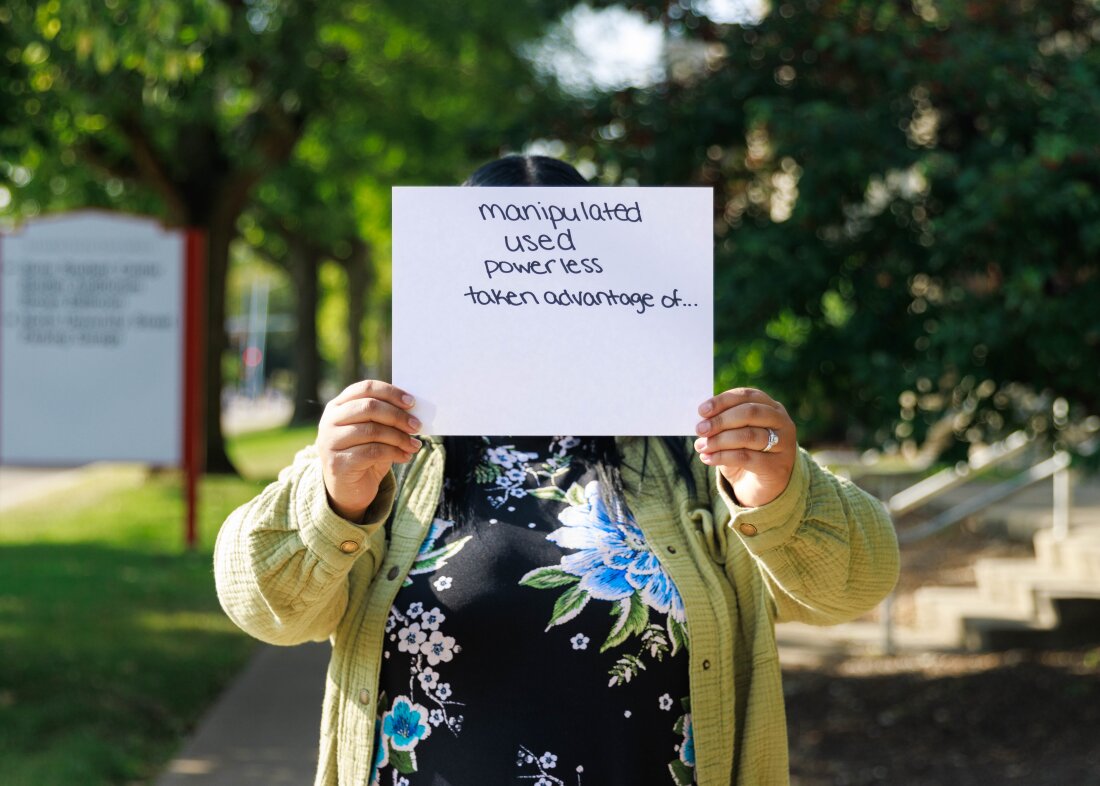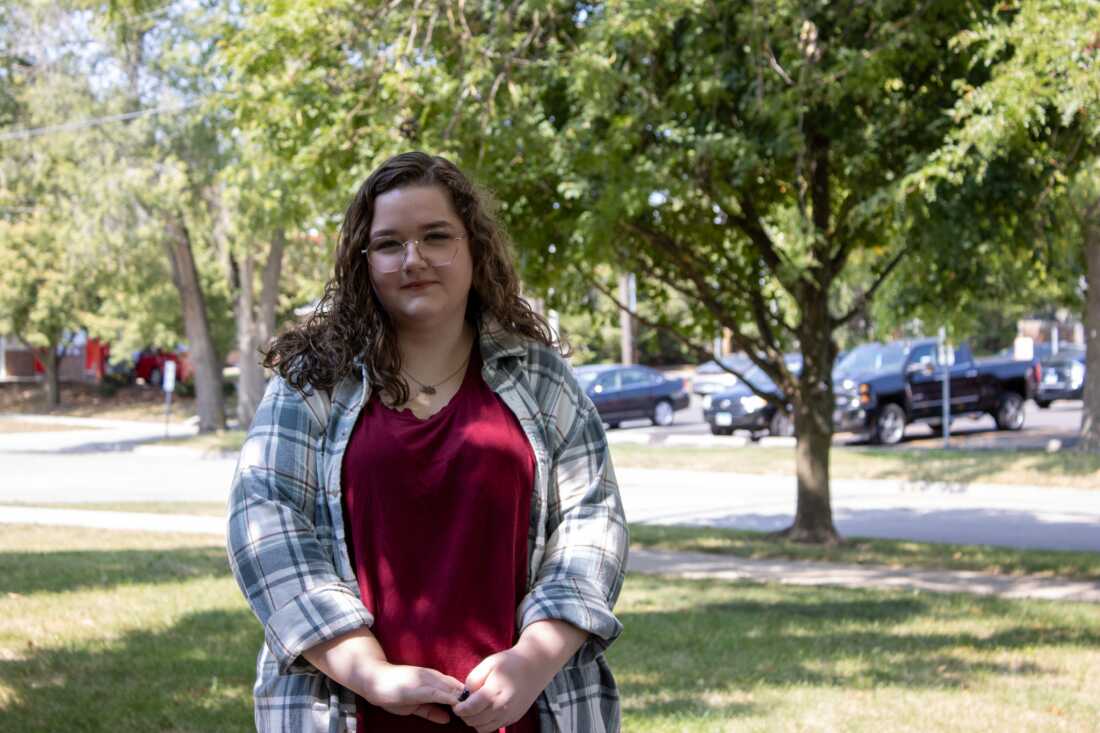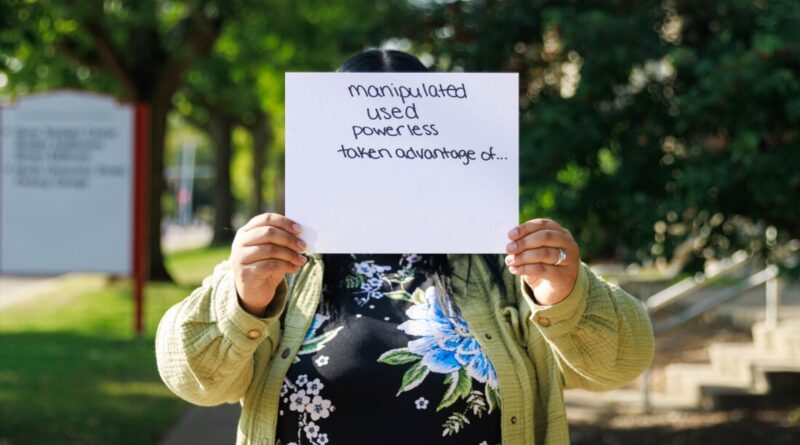988 hotline counselors are sometimes attacked by sexual predators

Daisy is a former crisis counselor at the 988 call center in Bloomington, Ill. He holds a piece of paper in front of his face that lists the emotions he felt when he made harassing phone calls while working there. She covers her face to keep her name anonymous because she doesn’t want her or professional networks to know about the abuse. Daisy was the name she used for callers to her work shifts.
Emily Bollinger/WGLT
hide description
toggle caption
Emily Bollinger/WGLT
This story contains descriptions of sexual acts.
In 2023, Lily Lantz began working full-time as a crisis counselor at the PATH Crisis Center in Bloomington, Illinois. It is part of a national network known as 988 Suicide & Crisis Lifeline.
It was his first job out of college, and it was common to call people who no longer saw the value in living.
At times the work was hard and demanding, but he had always wanted a job to help people and he felt called to work.
If you or someone you know is in crisis, please call, text or chat to the Suicide and Crisis Lifeline at 988, or contact the Crisis Text Line by texting TALK to 741741.
But there was a job hazard he didn’t expect: almost every shift, he said, he was talking to people who would massage their genitals to satisfy them. when they are called.
“Sometimes they would say things like ‘Your voice sounds good right now, you make me feel good right now,'” Lantz said.
NPR interviewed 10 current and former consultants from five different call centers who experienced similar inappropriate behavior. They have become a chronic and worrisome problem in the hotline industry.
There are also other forms of abuse, such as jokes, racist or sexist slurs and personal attacks on crisis counsellors. At 988 Suicide & Crisis Lifeline, those who perpetuate such behavior are known as “abusive relationships.”
The number of abusers is not counted nationwide, but since 988 was announced nationwide in 2022, the network of call centers has received more than 10 million contacts.
Data from one Portland, Oregon-based crisis center, Lines for Life, shows abusive names accounted for more than 1% of the roughly 5,000 monthly transactions.
Counselors stress that even just one harassment call can be devastating, and there aren’t enough steps in place to prevent such calls or help them deal with them when they happen. .
Incentive to save 988
Five former 988 counselors told NPR that because of sexual harassment, they no longer want to work for the hotline.
Another crisis counsellor, Daisy, said she quit because of abuse. Daisy was the name she used with callers at her job at the PATH call center. She does not want to be identified by her legal name while discussing this matter, because she does not want her or her professional network to know about the abuse.
Those events were traumatic. Daisy said: “I didn’t sign up to be a sex worker. “I signed up to help people in trouble.”
Lantz lost his job in June during the retirement process at PATH. He said that the only reason he didn’t quit his job early was that he switched to working during the day, where people who work hard didn’t do that often.

Lily Lantz, a former crisis counselor with the PATH Crisis Center in Bloomington, Ill.
Melissa Ellin/WGLT
hide description
toggle caption
Melissa Ellin/WGLT
After being fired, Lantz decided not to pursue another 988 job, due to the sexually harassing calls.
Instead, she gets a master’s degree in social work to become a trained doctor. (988 counselors are trained to intervene only in times of crisis, and 988 is not intended to be used as ongoing counseling. In some states — including Illinois — 988 counselors are not required to be certified. related to the mind.)
Lantz said: “We lose good people because of emotional involvement.
Long-term problem for hotlines
Crisis center managers are aware of the many challenges, but say there are no easy solutions.
Harassment callers have been targeting crisis calls for years, according to Greg Borders, chief medical officer at Lines for Life in Portland.
He said: “It is certainly not something new. “I’ve been with Lines for Life for 12 years, and it’s been around long before I got there and it’s still around.”
It is difficult to prevent or punish abusive callers. Calls to 988 are anonymised to protect the privacy of callers, so there is no way to see who is calling or what location they are calling from.
The only information available to a consultant is a phone number.
Counselors cannot block numbers associated with abusers – ever – because someone has that number. can have a real mental health problem in the future.
Another obstacle is a strict rule that every call that comes in, counselors ask if the person is at risk of self-harm. That part of the conversation is mandatory, even if the abuser calls back.
At PATH, this means counselors may hear repeated verbal abuse before they can transfer someone to a recorded message line.
Some of the harassers knew about the scheme and used it to catch him, Lantz said.
He said: “They could say they wanted to kill themselves.” “Whether that was true or not, I can’t say, but they were stroking their genitals to gratify them over the phone.”
Security protocols may vary
The 988 system is run by Vibrant Emotional Health, a non-profit organization with a federal grant to oversee a national network of 207 crisis centers.
Vibrant has recommendations for crisis centers that address this issue, but most of them are optional, said Shye Louis, who works on Vibrant’s clinical standards and training.
That flexibility is necessary because individual centers may be subject to different regulatory requirements from government agencies or accrediting organizations, such as the American Association of Suicidology.
Managers at crisis centers have tried to solve this problem. In 2020, Lines for Life in Oregon began allowing counselors to refer abusive calls to a supervisor, Borders said.
In Illinois, PATH implemented a new policy in 2023. If abusers continue to call the agency after being warned about their inappropriate behavior, they may be redirected to a pre-recorded message.
The message tells people their recent calls are “deemed inappropriate or potentially harassing” and urges them to stop calling as it interferes with legitimate calls.
Both PATH and Lines for Life allow a counselor to hang up if a caller becomes abusive, but only after the counselor has determined they are not in danger of harming themselves – Vibrant’s rule.
In Colorado, six former counselors are suing Rocky Mountain Crisis Center in federal court because they allege the organization made it more difficult for harassing callers to withdraw.
In an email to NPR, the disaster agency denied the allegations. “RMCP has stored proteins that empower our team members to limit when such a call is suspected and stop the call,” read the email statement. “Such protocols are guided by and aligned with Vibrant Emotional Health, the controller of 988.”
One of the plaintiffs in the suit, Myriah Montoya-Gallegos, told NPR about an incident involving a man masturbating over the phone. The supervisor who was listening to the call did not give him permission to hang up, he said.
Instead, he was told to change the conversation and focus on the caller’s feelings. “When he finished [orgasmed]he laughed about that, and thanked me, and hung up,” he said.
Iris Halpern, the attorney for the original counsel in the case, said the crisis centers are legally obligated to act.
“In the Colorado Anti-Discrimination Act, it literally says that even if the harassment was common in the past … you have to do something,” he said.
Solutions to keep the 988 durable
Addressing this issue is critical to the future of 988, said Adam Carter, CEO of PATH.
He said that harassing calls can waste resources and increase waiting times for people who really need it. He would like the Illinois legislature to help appoint 988 counselors to respond first.
In Illinois, first responder status protects workers from public liability in emergencies and provides additional benefits, such as access to a mental health care provider.
Counselors at several crisis centers believe stronger state laws can help prevent abuse.
In the 911 system, local laws often prohibit misuse of that call. Caller ID and services that allow police to track a caller’s location can help officers respond to 911 harassment calls.
None of these are available for the 988.
Daisy said Illinois “has a responsibility to protect (its) crisis counselors,” since 988 is partially funded by federal grants.
“There are people who abuse the phone, and there are reasons made as to why we can’t have consequences for that,” he said.
Some concerned councilors say they want change, but still believe in the future of 988 Lifeline.
“It’s a great tool for people in crisis when used properly,” said Angel Elrich, one of the plaintiffs in the Colorado case. I have a lot of faith… I think the 988 is amazing. I just want it to be stable. ”
This story comes from an NPR biography collaboration with WGLT and KFF Health News.
#hotline #counselors #attacked #sexual #predators
